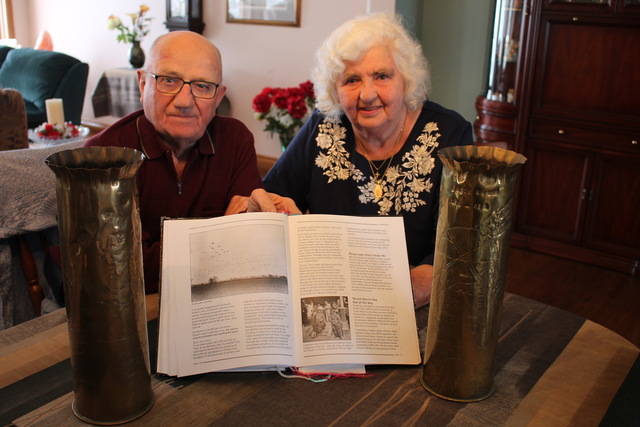Lawrence and Maria Van Lieshout were only six years old when Hitler’s forces invaded their tiny Netherlands village of Beek en Donk during the Second World War.
“We were all in bed and all of a sudden we were wakened by soldiers and they kicked us out of our beds,” Maria recalled in a May 8 interview. “They took our beds, and we all had to go and sleep in the haystack for a few nights and that was so scary. I dreamt of that for years because it was so dramatic.”
Lawrence, who was Maria’s neighbour at the time, said he also remembers the date the infantry walked in.
“We were scared stiff. They came in the house and they pulled the milk cans out of the well, because that’s where you had the milk cans for cooling the milk in the water, and they found eggs in the chicken coop and they took everything. The soldiers had blisters on their feet, so they took the wooden shoes from my father.”
The Van Lieshouts would go on to marry and emigrate to Canada in 1958, settling in Haliburton County in the early 1970s. During the invasion, in the 1940s, Lawrence recalled his family often billeted Dutch, German, American and Canadian soldiers.
May 8 marked the 75th anniversary of Victory in Europe or VE Day.
Maria said there was ammunition in their yard, and as kids, not knowing any better, they would climb in and around it, as well as onto and into tanks. Much of the food they grew, or raised, went to feed the soldiers. But Maria said they never went hungry. There was oatmeal porridge, potatoes and carrots and her mother made soup. Occasionally, someone was able to butcher an animal without the Nazis knowing so they could have meat. Lawrence added there were Red Cross food rations of vitamins and oranges.
Maria recalled her mother feeding a lot of people in the war, not just soldiers and their family, but adopted war kids and the elderly in town.
“We would have to go to church early in the morning, and we would drop off a loaf of bread or some butter or some meat if we had butchered some.” They became experts at smuggling.
Scary and exciting
The two said school was intermittent. The Germans blew up the main bridge over the canal. There were curfews and they had to black out their farmhouses at night to prevent bombing. They had fall-out shelters, or bunkers. The soldiers often took their bicycles so they would try to hide them.
Lawrence remembers the bombing raids near the end of the war, the drone of planes overhead for two to three hours in the middle of the night on route to Germany and back. While it was scary, as kids, it was also exciting at times.
For example, Maria said, “we always socialized with the soldiers, gave them eggs, and my mother would say, ‘I don’t think the chickens laid much.’ We would get a chocolate bar. I would go to my friends next door and we would get a little square each.” Lawrence said he used to play the accordion for the soldiers, also earning chocolate.
He said people have to remember they lived in a time when there was no television or radio. It was a complete news blackout. The Germans would drop flyers with “misinformation”. He said they had no idea what was going on in the world outside of their village.
When it came to liberation, they knew something was up as thousands of paratroopers dropped from the sky. The fighting continued, however, until one day it stopped. Canadian soldiers rolled over the cobblestones in their tanks and trucks.
“It was overwhelming,” said Lawrence. “We had bushels of apples because we had an orchard. We threw apples in the trucks and the soldiers waved. And we waved back. We grew up disliking the Germans and the Canadians were buddies. It was beautiful.”
The Netherlands, like the majority of Europeans countries, struggled to rebuild after the war. Lawrence said many people felt there was nothing left for them, which is why so many emigrated to Canada, the USA, Australia and New Zealand. The two six-year-olds, who grew up living next door to each other, and survived the German occupation during the Second World War, married in 1958 and boarded a boat for their new country.
“I guess we could have stayed at home,” Lawrence said, “but I figured the future was bleak and so we came here and we have enjoyed every bit of it.”





